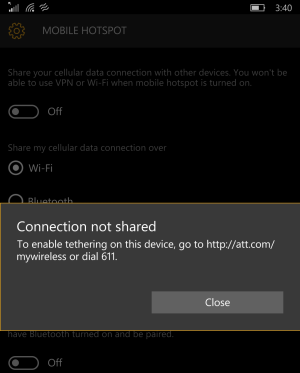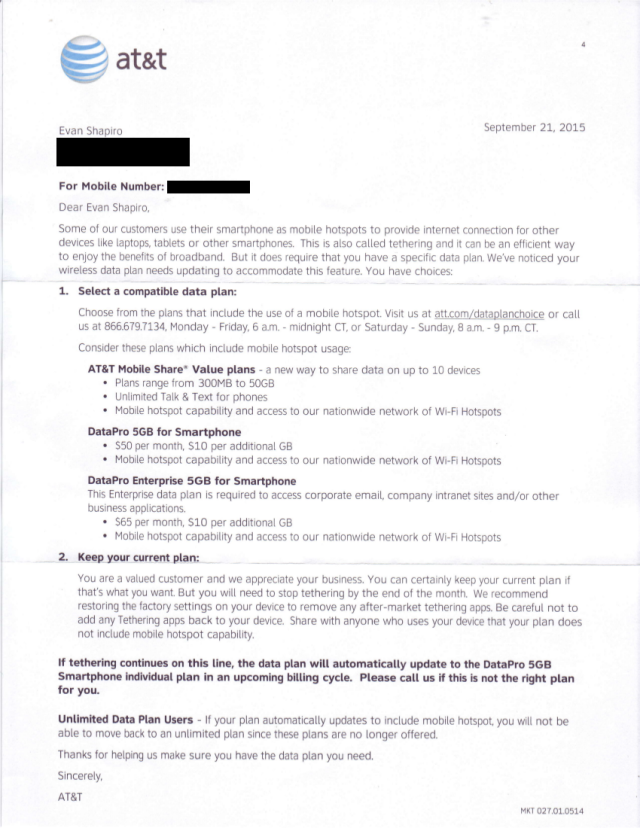Longtime AT&T customer Evan Shapiro still has one of the carrier's old unlimited data plans, but AT&T seemingly doesn’t want him to keep it.
Shapiro received a letter from AT&T last month telling him that he needs to either stop tethering or move to a limited data plan that allows him to tether. (Tethering shares a phone’s Internet connection with another device, such as a laptop.)
One problem: Shapiro says he’s never tethered. He provided Ars a screenshot from his phone which shows that he can’t use the device's built-in tethering functionality unless he contacts AT&T to enable the feature. 
Shapiro has had a few conversations with AT&T employees since receiving the letter, and he says they’ve never clearly explained why they thought he was tethering at all. Ars has been in contact with AT&T about Shapiro’s case since September 26, and we also have yet to receive a clear explanation for how the company determined Shapiro was tethering.
An AT&T spokesperson told Ars that “our network saw five instances of tethering over the last two months,” and that “the customer is using an unreleased mobile OS downloaded from the Internet.”
Shapiro told Ars that his off-contract Nokia Lumia 1520 isn’t jailbroken or rooted, but he did recently install the Windows 10 Mobile Insider Preview so he could get the latest phone operating system offered by Microsoft.
AT&T told Ars that “we think [the five instances of tethering] all happened after the beta OS was downloaded and installed by the customer.” While AT&T did not offer any details about the process it used to determine whether Shapiro was tethering, the carrier seems to be suspicious of Microsoft’s software, saying “its manufacturer hasn’t finalized it, nor has any carrier (to our knowledge) been able to test.” Aside from pointing out that Shapiro is running Microsoft’s beta OS, AT&T offered no explanation for why the company thought he was tethering. (Shapiro gave permission to AT&T for the company to discuss his account with Ars.)
Microsoft’s website says the Lumia 1520 is one of the supported phones for the Windows Mobile Insider Preview. With Windows 10, Microsoft says it is taking more control over how operating system updates are delivered to phones, potentially limiting the carriers' involvement in phone software updates.
AT&T started revoking unlimited data plans from customers who use unauthorized tethering services in 2011, and Shapiro is not the first AT&T customer to say he’s been falsely accused. "I know what tethering is, and I have absolutely never done it,” one customer wrote last September on an AT&T customer support forum. “Today, I received a letter from AT&T accusing me of tethering and threatening to take away my data plan.” That customer asked for details on what caused the warning, but AT&T “could not provide any other than repeating the original accusation.”
“You will need to stop tethering”
Shapiro is a Massachusetts resident who says he’s been an AT&T customer for two decades, going back to the Cellular One days.
The letter Shapiro received from AT&T says that he "will need to stop tethering by the end of the month.” It then recommends that Shapiro restore his phone to factory settings and “be careful not to add any Tethering apps back to your device.”

“If tethering continues on this line, the data plan will automatically update to the DataPro 5GB Smartphone individual plan in an upcoming billing cycle,” the letter concludes. “Please call us if this is not the right plan for you.”
Evan did call, but getting clear information from AT&T was a challenge, he said.
“The first person I spoke to after I got the letter said she knew nothing about the technical aspect, and that wasn't her job,” Shapiro said. “Meanwhile she was in the department you call about this issue, so that seems kind of ridiculous that she wouldn't know anything about it, yet she's the person you have to talk to.”
Shapiro says the next person he talked to mentioned a specific date in August on which AT&T believes he was tethering, “but he didn’t go into what they saw. Then he said, ‘I can hook you up with someone at tech support,’ but when I talked with tech support, the guy was like, ‘I have no information about anything in particular that we've seen on our end.’”
That tech support person insisted that someone else at AT&T “must have saw something if you got that letter,” according to Shapiro.
One of the employees he talked to suggested that Windows 10 could have something to do with the tethering claim but didn’t explain how, according to Shapiro.
It is possible to tether with Windows phones even without a carrier-approved plan, but Shapiro says he never has.
“I don't know what they see on their end. If they really do believe I was tethering, then their system is flawed,” he said.
Shapiro says he never even looked at his phone's tethering function until after he was accused of tethering. That's when he saw the popup message that says he'd have to talk to AT&T to enable tethering. That seems to indicate that he couldn't use the phone's official tethering functionality, but Shapiro says one AT&T employee told him that after they noticed tethering activity, "they sent something to my phone that changed the settings so I get that popup."
"I have no way of knowing because I had never gone to that setting before that," he said.
Shapiro says that when he ended his last call with AT&T, it wasn't clear whether the company still believes he was tethering or whether they would continue trying to push him onto a limited data plan.
AT&T told Ars that “we attempted to walk the customer through methods of discovering why these tethering occurrences occurred, but on that first call, the customer didn’t have time to speak with our advanced Windows tech expert.”
AT&T did not explain why the subsequent calls between Shapiro and AT&T did not reveal any more specifics. But AT&T said it will continue talking to Shapiro "to determine the root issue" and that it won’t send any more notifications about tethering “as we work this out.”
“We take this issue very seriously, and we only inform our customers through formal communication when we have noticed tethering activity,” AT&T said. “We will not continue to send notices if the customer does not attempt to tether again.”
AT&T’s “unlimited” data has more than one limit
Shapiro suspects that AT&T is trying to move people off the old unlimited data plans, which he has been grandfathered into since AT&T stopped selling them to new customers in 2010. The first AT&T employee he spoke to tried to convince him to buy a 5GB plan, he said. Shapiro said he pays $30 a month for the unlimited data, though his full bill is around $100 including texting and voice with international calling.
Shapiro said he rarely uses more than 5GB a month, but the tethering accusations have “really turned me off in terms of being a customer and I'm thinking about switching to another carrier.”
AT&T has controversially throttled unlimited data customers when they use more than 5GB in a month. Shapiro said he’s received a couple of text messages over the last six months saying he was about to be throttled.
AT&T recently boosted its throttle point from 5GB per month to 22GB and made the throttling less severe by slowing customers down only when the network is congested, instead of 24 hours a day. But AT&T is facing a $100 million fine from the Federal Communications Commission, which says the carrier violated transparency rules by falsely labeling the plans as “unlimited.”
Separately, the Federal Trade Commission is suing AT&T in an attempt to get refunds for customers who were throttled.
“If you pay for unlimited data, it should be unlimited,” Shapiro said. "They do everything they can to try to get you off of that plan. I don't really get it, if they don't want to offer it, then just tell people that are grandfathered, ‘we no longer offer this plan.’”
reader comments
160